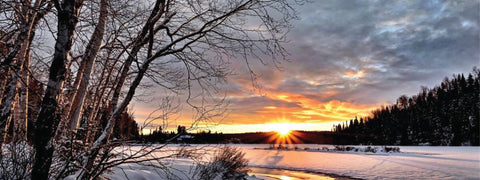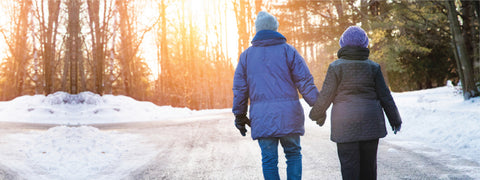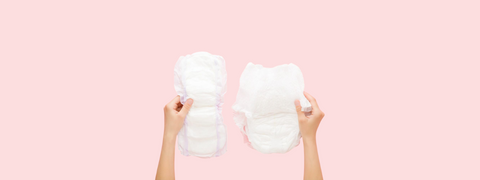Be Prepared for the Cold Spell
We need to take extra care during the winter months. Icy conditions, shorter daylight hours, and the cold weather, can significantly increase the risk of falls and injuries.
Falls are one of the leading causes of hospital visits in winter, particularly among older adults.
Taking the steps to reduce the risk of a fall, and maintaining good health is particularly important, for older adults, those who have mobility challenges, and for those who are medically vulnerable.
Keep Safe and Mobile Indoors
- Dress warmly and in layers.
- Individuals with reduced mobility should take extra measures to protect their hands, feet and other areas of the body that are particularly subject to cold.
- If your disability is affected by a drop in temperature, try and be aware of the weather forecast in order to allow you plan for pain management. Wear the correct amount of layers to try and maintain your body temperature at the required level.
- Eat well.You should eat regular hot meals and drink plenty of fluids, this will keep you warm and will give you energy to keep active.
- Have a small supply of non-perishable, easy-to-prepare foods. Keep extra supplies of essential medication in case it is difficult to get to the pharmacy.
- Leave a key and contact details with neighbours or family.
- Have a list of Emergency numbers available too you, or kept on your mobile phone contact list.
- Ensure that you are on the vulnerable customer registers for the energy companies and Irish Water.
- If you have an assistance dog, be sure to keep them warm as well. Be sure to always have a blanket for the animal to rest on. Keep the animal indoors as much as possible.
Prevent Falls
- Leave a low energy light on at night time, preferably one with a high light output.
- Make sure wires or cords, such as from lamps or telephones, do not trail where you walk.
- Arrange furniture so that you can easily move around all your rooms
- Keep the floors clear from items such as papers and books that could cause you to trip.
- Remove rugs or use non-slip tape or backing so rugs will not slip.
- Consider installing hand rails on both sides of the stairs.
- Wear well-fitted shoes with non-slip soles if you have to go out, try to limit walking during the cold weather.
- Have a shovel and bag of salt to keep paths clear and safe.
- Have Flashlights to attach to keys and clothing. Have batteries for torches in the event of power cuts.
- Have your vision checked. Your eyesight changes as you get older; poor vision can increase your chances of falling.
- Ensuring walking aids, such as sticks or frames, are fitted with non-slip rubber ferrules.
- Consider wearing a personal alarm so that family or neighbours are alerted if you fall.
- Consider Motion-sensor fall alarm systems to alert a partner or carer of a fall.
- Have a Grabar fitted beside the toilet , bath, shower or near a sink if your balance is poor.
- Use a non-slip shower or bath mat.
- Have Lights over stairways and by outside entrances.

Family, Carers, Friends and Neighbours can greatly help
- Keep in contact by phone or text. Ensure the person can access their phone charger.
- Help to shovel, grit or sand or de-ice a driveway, footpath, and to keep steps clear of snow .
- Clear snow or ice early in the day if possible.
- Never use boiling water to clear snow, as it may re-freeze and cause the formation of black ice.
- Offer to collect essential fuel supplies, shopping or to collect medications.
- If you have to use medical equipment or a powered mobility device every day please make sure that they always have access to a power supply.
- If you have any doubts about the safety of someone you know who has a disability seek the assistance of An Garda Síochánaor local health and social services .
Have a plan if you fall or at risk for a fall
If you do feel yourself falling, don't try to catch yourself with your arms. That can lead to more injuries. Try to take the hit on your buttock or back. After a fall, wait for someone to help you in case you are injured or to avoid subsequent falls. Some people further injure themselves by springing up after a fall instead of waiting for help.
If you fall indoors and you have not injured yourself, you may be able to roll yourself over and crawl to use furniture, to pull yourself into sitting, and to seek further assistance.
Use your pendant alarm or mobile phone, to seek help.
If you have a fall, even a minor one, make sure you visit your doctor for a check-up.
Remember to always use your best judgment when out and about in the ice and snow. Be careful and aware of your surroundings. Stay safe and healthy this winter.
Useful References and Resources
www.gov.ie – Be Winter Ready
gov.ie - Health Advice from the HSE - Be Winter Ready
hse.ie Avoid Slips, trips and falls during the cold snap https://about.hse.ie/news/avoid-slips-trips-and-falls-during-the-cold-snap/
www. Met.ie – National and Regional Weather forecasts
www.theaa.com Road traffic news




